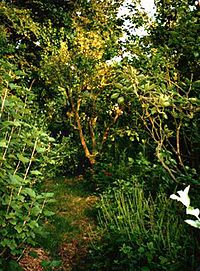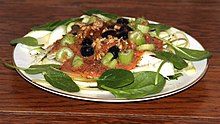Raw veganism
It has been suggested that this article be merged with Raw foodism. (Discuss) Proposed since July 2020. |
This article needs more reliable medical references for verification or relies too heavily on primary sources. (July 2020) |  |

Raw veganism is a diet that combines the concepts of veganism and raw foodism. It excludes all food and products of animal origin, any food that is processed or altered from its natural state, and food cooked at high temperatures. Raw veganism has rarely been practiced in history,[1] but it has become more of a trend recently.[2]
History
Early, pliocene hominids (like australopithecines), who split from apes around 4.4 million years ago, ate "buds, flowers, and shoots", and some soft fruit, as their teeth couldn't process meat (which is a "tough, pliant food").[3]
The world's first raw vegan restaurant called Raw Food Dining Room, at 640 S. Olive St. was opened in Los Angeles, California in 1918 by John and Vera Richter[4] (no longer in existence).
Robert Hart practiced raw veganism from forest gardening as a food production system based on woodland ecosystems incorporating fruit and nut trees, shrubs, herbs, vines, and perennial vegetables.[5][6] Forest gardens are a resilient agroecosystem.[7]

Research on vegan diets
A vegan diet may reduce the risk of cancer.[8] A 2009 review found that a vegan diet improved the management of diabetes and inhibited progression of atherosclerosis, while enhancing weight loss.[9] According to one review, the overall mortality rate for people practicing a long-term vegan diet is similar to mortality in the general non-vegan population.[10]
A 2020 review of vegan and vegetarian diets showed association with a higher risk of depression and anxiety, particularly among people under 26 years old.[11] A 2019 review found that vegan and vegetarian diets may cause loss of bone mineral density and a higher incidence of bone fractures, if dietary calcium is deficient.[12]
Concerns
The British Dietetic Association named the raw vegan diet one of the "top 5 worst celeb diets to avoid in 2018", raising a concern that it could compromise long-term health.[13]
Contamination
Food-borne outbreaks of bacterial, viral or parasitic infections, zoonotic or human,[14] are caused by consumption of microorganism-contaminated raw herbs and spices,[15] fruits, vegetables, or other plant foods.[16][17] The US Food and Drug Administration recommends cooking when possible to kill microorganisms in raw plant foods.[18][19]
Adulteration
Adulteration is a concern for spices that are imported from locations with substandard regulations for hygienic food preparation.[20] Cooking may not eliminate adulterants, but may reduce microorganisms.[20][21]
See also
References
- ^ Fontana, Luigi; Shew, Jennifer L.; Holloszy, John O.; Villareal, Dennis T. (2005-03-28). "Low Bone Mass in Subjects on a Long-term Raw Vegetarian Diet". Archives of Internal Medicine. 165 (6): 684–9. doi:10.1001/archinte.165.6.684. ISSN 0003-9926. PMID 15795346.
- ^ Kamiński, Mikołaj; Skonieczna-Żydecka, Karolina; Nowak, Jan Krzysztof; Stachowska, Ewa (2020-02-12). "Global and local diet popularity rankings, their secular trends and seasonal variation in Google Trends data". Nutrition: 110759. doi:10.1016/j.nut.2020.110759. ISSN 0899-9007.
- ^ Teaford, Mark (October 5, 2000). "Diet and the evolution of the earliest human ancestors" (PDF). PNAS. 97: 13506–13511.
- ^ Meares, Hadley (6 June 2020). "L.A. Has Been Eating Raw Vegan Food Since 1918, Thanks to This Communist, Feminist Angeleno". Retrieved 19 February 2019.
{{cite web}}: CS1 maint: url-status (link) - ^ Robert Hart (1996). Forest Gardening. Chelsea Green Publishing. ISBN 978-1603580502.
- ^ Patrick Whitefield (2002). How to Make a Forest Garden. Permanent Publications. p. 5. ISBN 978-1856230087.
- ^ Douglas John McConnell (2003). The Forest Farms of Kandy: And Other Gardens of Complete Design. Ashgate. p. 1. ISBN 978-0754609582.
- ^ Dinu, Monica; Abbate, Rosanna; Gensini, Gian Franco; Casini, Alessandro; Sofi, Francesco (2016-02-06). "Vegetarian, vegan diets and multiple health outcomes: A systematic review with meta-analysis of observational studies". Critical Reviews in Food Science and Nutrition. 57 (17): 3640–3649. doi:10.1080/10408398.2016.1138447. ISSN 1040-8398. PMID 26853923.
- ^ Barnard, Neal D; Katcher, Heather I; Jenkins, David JA; Cohen, Joshua; Turner-McGrievy, Gabrielle (2009). "Vegetarian and vegan diets in type 2 diabetes management". Nutrition Reviews. 67 (5): 255–263. doi:10.1111/j.1753-4887.2009.00198.x. ISSN 0029-6643. PMID 19386029.
- ^ Appleby, Paul N.; Key, Timothy J. (2015-12-28). "The long-term health of vegetarians and vegans". The Proceedings of the Nutrition Society. 75 (3): 287–293. doi:10.1017/s0029665115004334. ISSN 0029-6651. PMID 26707634.
- ^ Iguacel, Isabel; Huybrechts, Inge; Moreno, Luis A; Michels, Nathalie (2020-06-01). "Vegetarianism and veganism compared with mental health and cognitive outcomes: a systematic review and meta-analysis". Nutrition Reviews. doi:10.1093/nutrit/nuaa030. ISSN 0029-6643. PMID 32483598.
- ^ Iguacel, Isabel; Miguel-Berges, María L; Gómez-Bruton, Alejandro; Moreno, Luis A; Julián, Cristina (2018-10-29). "Veganism, vegetarianism, bone mineral density, and fracture risk: a systematic review and meta-analysis". Nutrition Reviews. 77 (1): 1–18. doi:10.1093/nutrit/nuy045. ISSN 0029-6643. PMID 30376075.
- ^ "Top 5 worst celeb diets to avoid in 2018". British Dietetic Association. 7 December 2017.
The British Dietetic Association (BDA) today revealed its much-anticipated annual list of celebrity diets to avoid in 2018. The line-up this year includes Raw Vegan, Alkaline, Pioppi and Ketogenic diets as well as Katie Price's Nutritional Supplements.
- ^ "Salmonella and Tomatoes" (PDF). U.S. Department of Agriculture. Retrieved 7 June 2020.
{{cite web}}: CS1 maint: url-status (link) - ^ "Risk Profile: Pathogens and Filth in Spices". US Food and Drug Administration. Retrieved 15 December 2018.
- ^ "Foodborne illnesses". National Institute of Diabetes and Digestive and Kidney Diseases, US National Institutes of Health. 2010-02-01. Retrieved 2018-12-16.
- ^ Erickson, Marilyn C.; Doyle, Michael P. (2012). "Plant food safety issues: Linking production agriculture a one health approach: Workshop summary". US Institute of Medicine; Washington (DC): National Academies Press. Retrieved 2018-12-16.
- ^ "Rarely Consumed Raw Produce. Produce Safety Rule (21 CFR 112)" (PDF). US Food and Drug Administration. Retrieved 15 December 2018.
- ^ "What the Produce Safety Rule Means for Consumers". US Food and Drug Administration. Retrieved 15 December 2018.
- ^ a b "Code of Hygienic Practice" (PDF). United Nations, Food and Agriculture Organization. Retrieved 15 December 2018.
- ^ Kumar, Pradeep; Mahato, Dipendra K.; Kamle, Madhu; Mohanta, Tapan K.; Kang, Sang G. (2017-01-17). "Aflatoxins: A Global Concern for Food Safety, Human Health and Their Management". Frontiers in Microbiology. 07: 2170. doi:10.3389/fmicb.2016.02170. ISSN 1664-302X. PMC 5240007. PMID 28144235.
{{cite journal}}: CS1 maint: unflagged free DOI (link)
